Music Without Genres: In Conversation with Jackie Venson
How Jackie Venson eschews the limitations and expectations of genre, industry, and aesthetics.
From reimagining what it means to be a musician during a global pandemic to having her sister—who knows her best—work on her team, Jackie Venson centers authenticity and resourcefulness within her career. And as a result, she’s created a resounding name for herself by eschewing the limitations and expectations of genre, industry, and aesthetics.
Since 2013, the Austin-born musician has released five EPs, three live albums, and three studio albums—along with two albums under her DJ moniker, jackie the robot—each one transcending the previous release yet remaining grounded and bound together by her stand-out guitar riffs, limitless songwriting, and commitment to genuineness. Last year, Venson released her latest studio album, Vintage Machine, which she describes as a rock album with it’s own individual flavor aligned to that of Prince: “It’s mostly pop rock, with a heavier lean on rock, but it’s also electronic, so it’s not classic rock. It’s like Prince rock, but it’s his very individual, specific flavor. And that’s how I feel about Vintage Machine: it’s rock, but my version.”
This commitment to self has gained Venson numerous accolades from the Austin Music Awards: in 2019 she won Best Guitarist, making her the first Black woman to receive the award; and this year she’s won Best Livestreaming Artist, Musician of the Year, Album of the Year (Vintage Machine), and Musician Who Went Above and Beyond. “An interesting cherry on top of an interesting year,” she laughs, as the 2020-2021 awards followed the recent detrimental winter storm in central Texas amidst a global pandemic.
In partnership with Marshall for our In Development series, we spoke with Venson about her close working relationship to her sister, the limitations of genre, and how she achieves her tone.
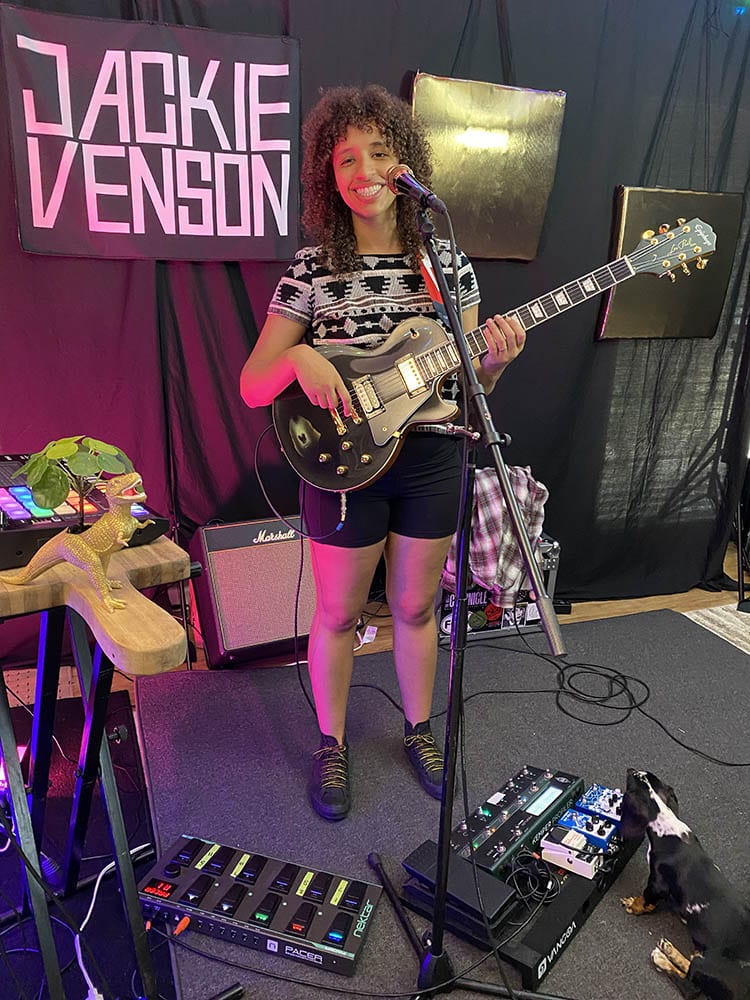
You’ve mentioned that the opening track on Vintage Machine is about your father, Andrew Venson, who is a retired professional musician. And your sister, Christina Venson, is your assistant manager and more. Can you talk about the importance of your family’s involvement within your career?
People always focus on my dad being a musician because it’s an easy story, but it’s only a fraction of the picture. My dad believes in letting kids naturally find their way, and so a lot of my siblings don’t play music. My mom’s the reason why I even started playing the piano. So even though my dad nurtured and fostered me, my mom is the one who was like, “I’m signing you up for piano lessons, you have to do this, and if you hate it after a year you can quit.”
And then for the first decade of my life, I was scared to do anything unless my sister was doing it. I couldn’t leave the house, couldn’t walk to school without Christina… I was completely attached at the hip. Anything my mom wanted me to do, she’d get my sister to do it too.
As I started high school and Christina went to college, it changed. We got to know each other and develop alongside each other. We turned into the people we are with each other. We’ve always been the closest; it was just innate. And that’s why it’s so easy to fit her into my career, because she genuinely cares just as much as I do. It’s very hard to find other people who you can trust on that level.
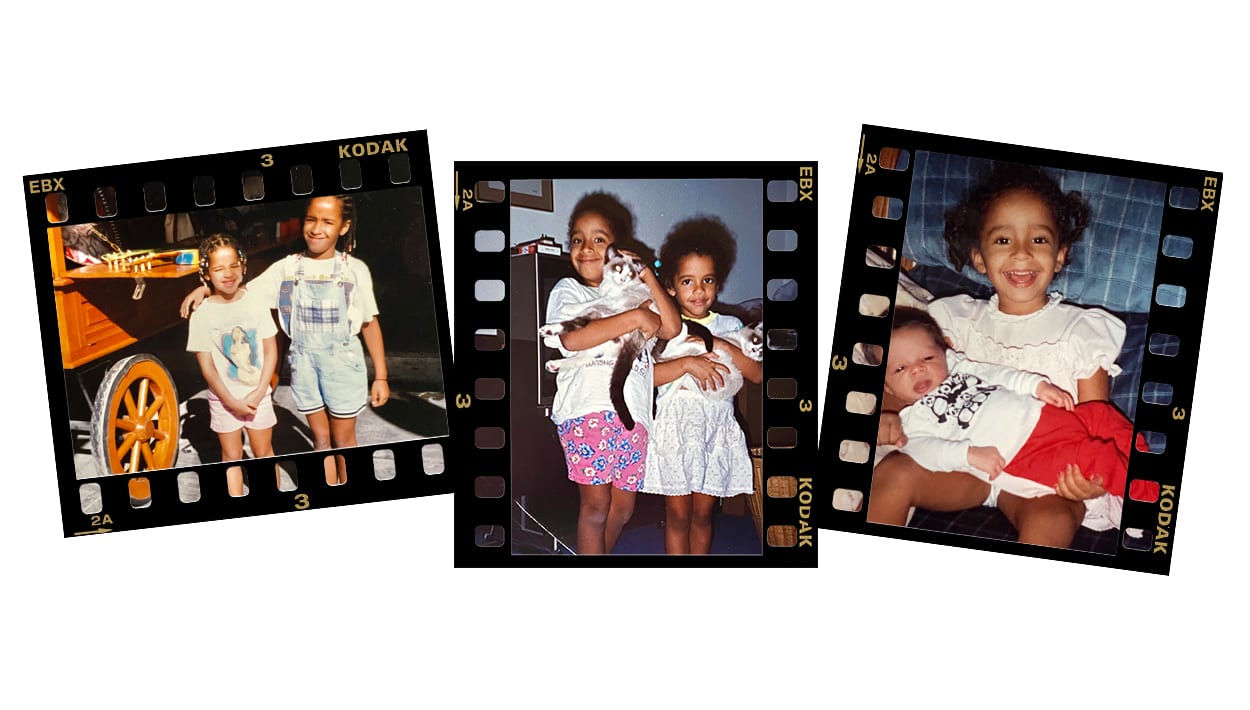
Are there any outstanding moments in which collaborating with your sister felt especially powerful?
The first EP I ever released, Rollin’ On in 2013, I had no idea what I was doing. I was only two years into playing the guitar. I just knew enough to record six pretty simple bluesy songs and some covers, just so I could have something to sell at my shows. I happened to know someone who had just gotten into recording, and it was this thing I threw together. I had no idea what I was embarking on. I realized I needed album art if I was going to print a CD, and all that stuff. It was such a learning curve for me.
So I’m freaking out, trying to get this thing done, it’s taking me forever, and I don’t have any artwork. And that’s the first time I hired Christina. I was venting to her on the phone, and she was like, “If you give me a nice picture of you playing guitar I can probably throw something together.” So I sent her a picture, and she sent me back a five-panel digi-pack template made from that one picture. It was really sleek. Ever since then, she’s been a jack of all trades.
When I spoke with Christina, she mentioned that aside from assistant manager, she’s your tour manager, and also deals with fan engagement, artwork, and wardrobe. Tell me more about how your relationship lends to a successful partnership in your career.
Christina is a visual artist, so she helps me with aesthetics, and that includes so much: wardrobe, makeup, hairstyle, album artwork, the videographers and photographers I choose… She has an eye. And when you don’t have an eye, it’s hard to turn yourself as an artist into a package—not materialistic, but in that there’s so many us, over seven billion humans, and we all have to find our own place. Imagery has something to do with that. If you have a look and a vibe, there’s ways to get that look and vibe out in whatever medium you come across on.
[As a musician], you have to appeal to people who have never met you. I want people to know who I am before they show up to a show, so that they’re not surprised. I don’t want them to know who I am so that I can be a product; I want them to know who I am so that they can have a frame of expectation. Because at the end of the day, we’re all strangers. So it’s really important to have a uniform aesthetic. You know, I choose to wear sneakers, so people probably get a pretty laid back vibe from me, but the sneakers are always really fly. So I care about my sneakers, but I also care about being comfortable. And Christina’s the one who pointed that out. It’s not about trying to sell yourself—it’s about people wanting to get to know you more, it’s about people liking your vibe and wanting to go to your show. That’s what it’s about.
I can only imagine how alleviating it is to have someone like your sister, who already knows your vibe so well, to take that on so you can focus on the music.
It’s a huge weight lifted. And a lot of people rebel against it: they say it’s not important, it’s stupid, it’s “just about the music.” But it’s not stupid stuff, it’s real. And if you think about it logically, if someone’s watching my music video in Finland right now, I have no control over their thoughts about me or my music. But I do have control over what they’re seeing. That’s important, and Christina is somebody who really drove that home for me. I used to be someone who rebelled against it, because I knew it was too much of a weight for me to carry on my own. I just didn’t care. I wore jeans and a t-shirt to my shows, and like I said, there’s nothing wrong with jeans and a t-shirt, but if you’re going to do it, do it. There’s ways to do what you gravitate toward without it being sloppy, and when I was doing it all on my own it was sloppy because it was all I was capable of as a singular person. But Christina was the one who was like, “This is important. I’m going to do it for you and you’ll see how important it is.” And she was right.
Describe the relationship between you and your sister in 3 words.
Hilarious. Fun. Fulfilling.
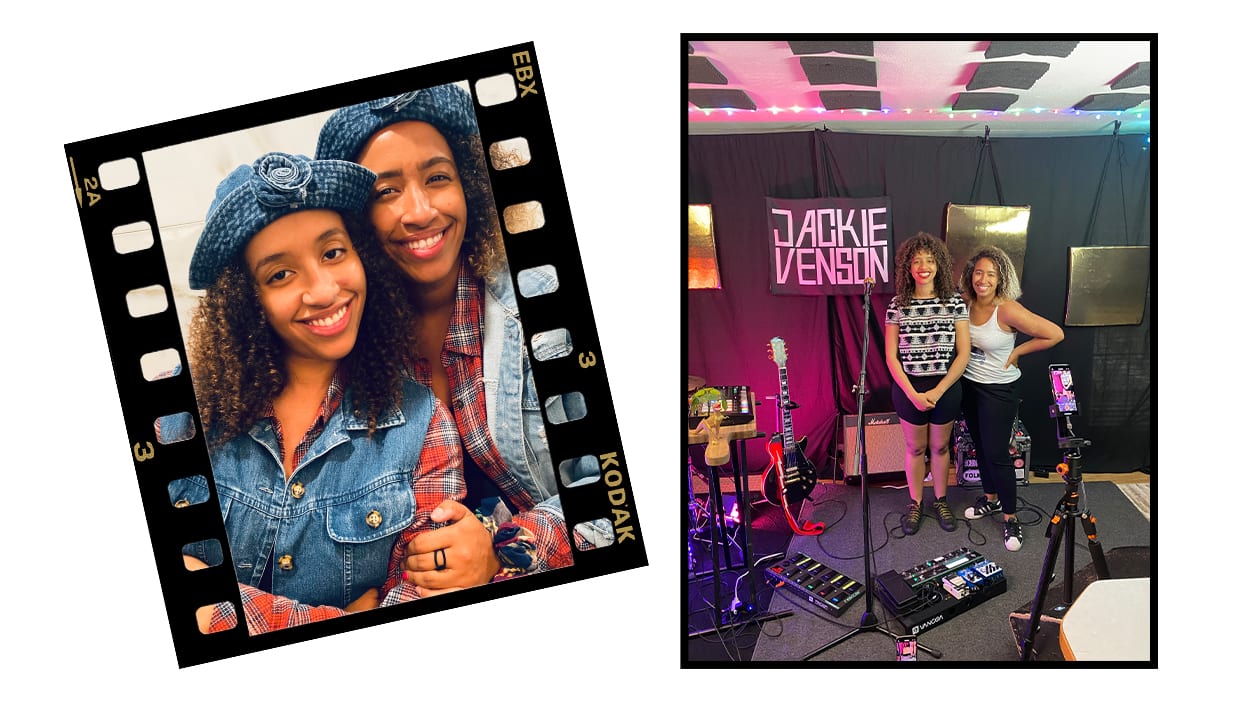

Let’s switch gears to Vintage Machine, which has a much bigger sound than your previous albums, and incorporates more synth and 70s/80s pop, rock, and R&B stylings. In what ways do you feel you are reimagining these classic genres to make them your own?
I’m trying to show that the genres are classic, but they also are huge. When we say R&B, we’re talking about millions of sounds, millions of different songs from all over. Pop in every single color, language, gender, non-gender… and the same goes for all the rest of the genres. So I’m trying to get people to stop paying attention to genres. They don’t matter, just listen to the artist. “What does this music sound like? Oh, it’s R&B…” That’s like saying this meal has salt in it; I’m trying to get people to take genres with a grain of salt. Just listen for yourself—stop trying to put words on things that can’t be defined.
Genres can be so limiting, especially when the industry forces them onto musicians.
Yes, and that just leads to discriminatory practices. Genres and basing things on genres—like festival lineups, all that stuff—is just another reason to be exclusionary. The sooner we can move away from that, the sooner we can live in a more equitable society and music industry. I’m against anything that labels anyone—that’s what all the isms are. I don’t want it in music, I don’t want it in society, I don’t want it anywhere. I just want everyone to give everybody the time of day.
Is there anything crucial, anything you need to dial in, that feels specific to your tone?
I use a lot of distortion and delays for leads, and for rhythm I like a clean tone. For Vintage Machine I jumped between clean and distorted constantly throughout every song. I even have tiers of distortion: there’s clean, then there’s amp distortion, then there’s pedal distortion. Sometimes I used amp distortion, sometimes pedal distortion, and you can usually hear the difference. The pedal distortion is really saturated and intense—as soon as BOSS DS-1 gets kicked on, it’s like lightning striking. Amp distortion I use for a lot of the rhythm, like wah sounds. And clean tones I use on the classic rhythm parts. I go through those three, depending on what the song is calling for.
With Vintage Machine you switched from working with a full band to experimenting with drummer Rodney Hydner. How did your songwriting process shift with this change?
I didn’t work with players on Vintage Machine because a lot of the players I prefer to work with were not in town anymore, and finding other players is overwhelming for me, especially when I can play three other instruments. I had the songs written, and I wanted to get the show on the road.
I wrote the songs for Vintage Machine on my sampler, a Pioneer Toraiz SP-16, so I had all the parts worked out, really strong bones. That’s why I used the sampler, to hear how that bass part sounded with that rhythm part instead of having to herd cats for rehearsal. I was like, “If I make demos this way, why don’t I make recordings this way? It would be a lot of cheaper.” It seemed like it would be real easy, and it was. I mean… it wasn’t easy, it took a long time: two weeks of eleven-hour studio sessions, but it was way easier than getting a bunch of people together and on the same musical page. Musically it made sense, and logistically it was a huge relief to just call in Rodney to kick the shit out of those drums. And also, my producer [Chris “Frenchie” Smith] is a guitar and bass player, so between us three, we’ve got a whole world of musical experience.
I will say this though: there’s something about playing a record down in the studio with a band—and I will do that again, I will—but it’s really nice to know that the way I made Vintage Machine is an option. No matter what, I can make a record. It was my first exploration in low dependency record-making, depending on a small amount of people to make a big sounding record. I’ll do that again too, but I have a specific plan to record an album played by a band—not like we all play our parts to a click track, we will play it together live. There is something about that, and I want to capture it: to have live arrangements, and have that be your studio record.
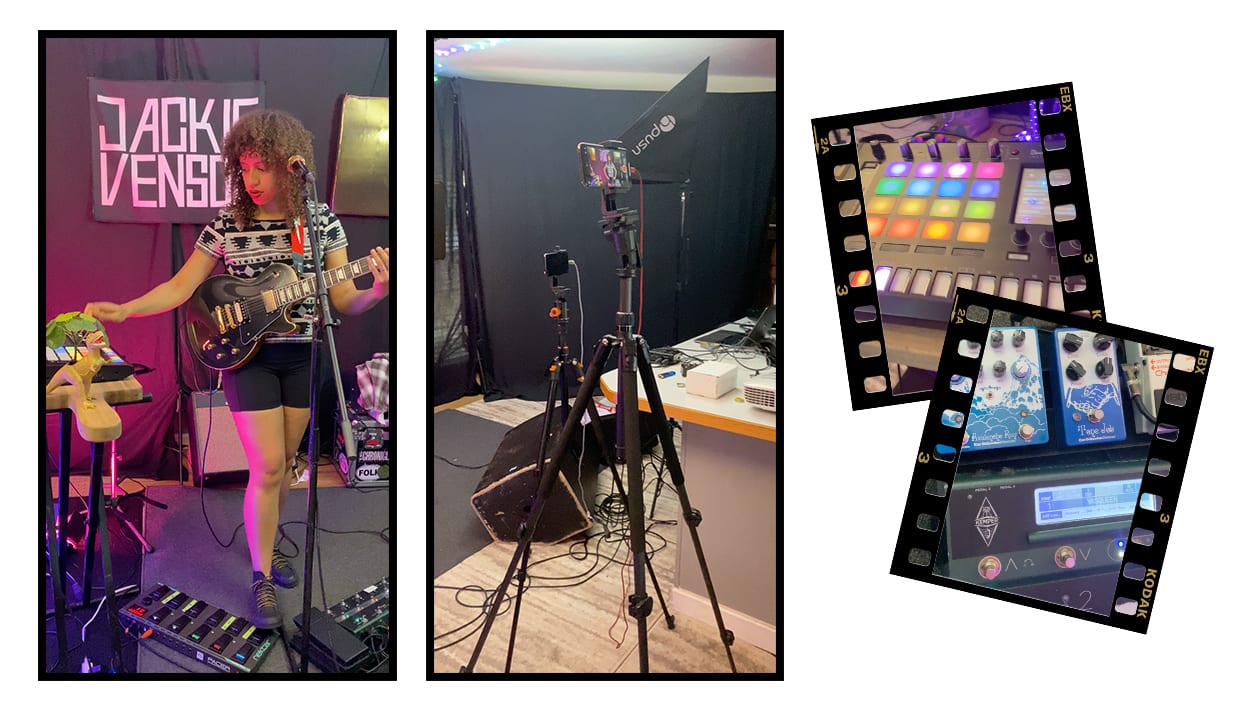

It’s kind of an amazing coincidence that you chose this method of recording with Vintage Machine, given that when you were mastering we were just entering the pandemic.
Yeah, it’s pretty weird. And you can say that about a lot of things. I started livestreaming weekly in January 2019 with Jackie Venson Live on Thursdays, so you can kind of see that pop up a few different times in my career, where I seem like I’m just stumbling ass backwards into the way. There was no way I knew that I would need to become a regular livestreamer; I was just doing it because I was trying to sell tickets to a concert without playing too many physical shows and oversaturating the market. It was what I had to do in that isolated moment, and it just so happened to relate to all this mess we’re now going through.
I’ve seen you use the Marshall SV20C Studio Vintage combo amp on a few of your livestreams. Can you talk about how and when you’ve been using it? What about it feels important to your tone?
I’ve been using it on my streams, at least three times a week, ever since I got it. I’m not even kidding—it has not left my streaming studio. I did a December 2020 marathon where I played every single night of the month, including the holidays, and that Marshall SV20V was the amp.
You can get so much tone out of the Marshall SV20V because it doesn’t just have EQ knobs. It has two volume knobs, so you can make it more or less distorted. I always love amps like that—I was just talking about amp vs. pedal distortion, so this amp is really cool for that. Plus it’s got the tubes, so it has a really warm sound. But you can also have it be really crunchy. It also has a lot of EQ options, and that’s huge. And it’s customizable: I don’t like when amps don’t give a lot of options, when the amp is telling me what my tone is going to be. I need to tell the amp what my tone is, not the other way around. And you do not have that problem with this amp. Anything I didn’t like about it, there was a knob for that. Like, “Oh it’s too trebly… there’s a knob for that!”
I keep the presence knob slightly higher than the treble knob, but I still have the treble pretty close to middle. And I have the mid knob also right at middle or slightly over, and the bass knob slightly right of middle. So it’s not exactly flat, but it’s not really intense in any one way. I do like having a little more bass because whenever I’m playing solo, sometimes there’s not bass happening and I like my guitar to be a little bit more bottomy.
It has two volume knobs: a high treble and a normal volume. I turn up the high treble because it adds just a little bit of crunch to it. And I like having a tiny bit of crunch so you know it’s an amp, even on the clean tone. I don’t want the amp to sound like a speaker, I want it to sound like an amp—otherwise, what’s the point?
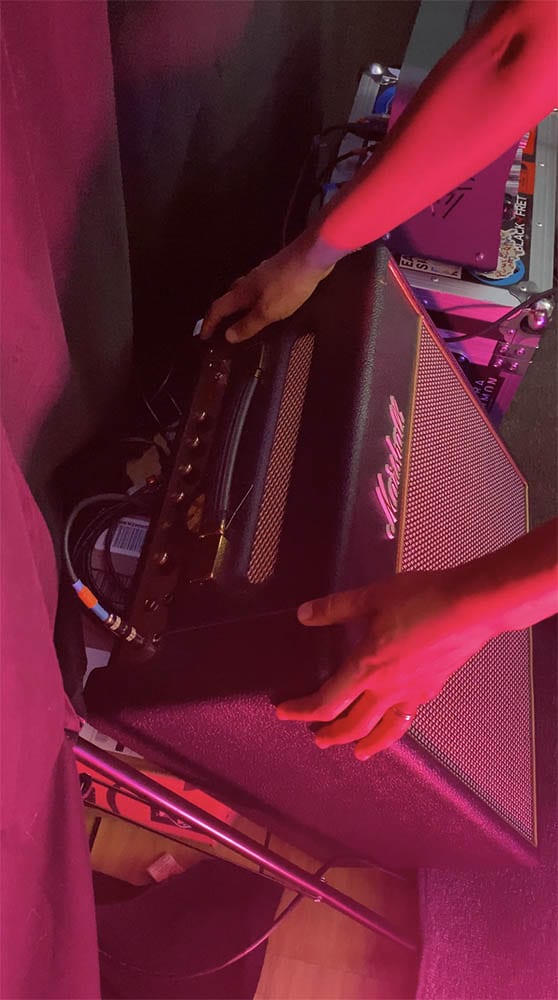

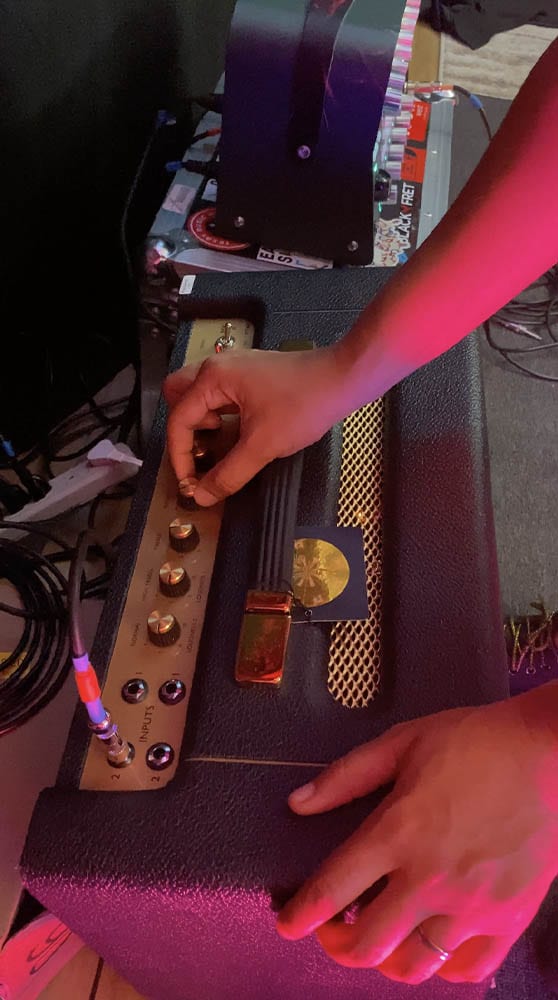

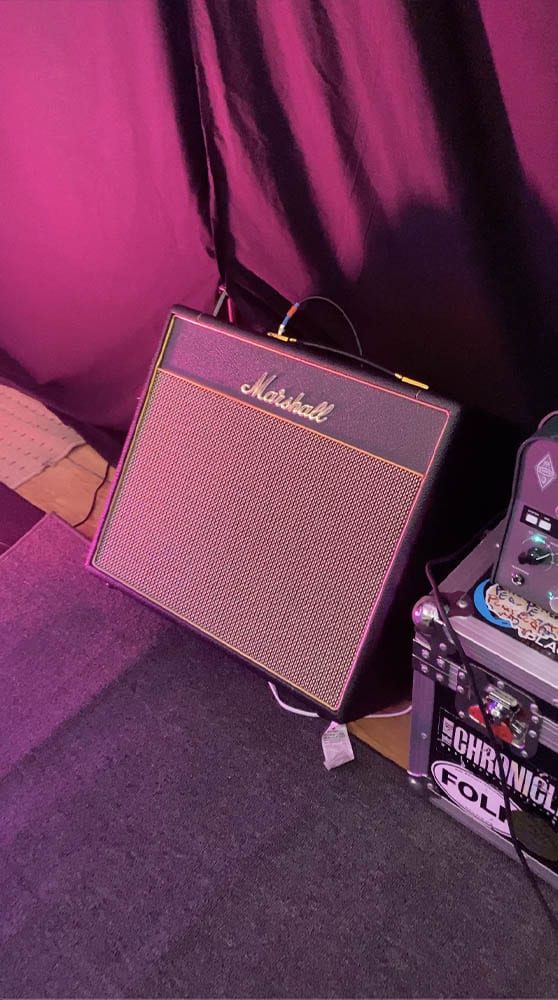

What gear have you been using with the Marshall SV20V?
I really like using my Epiphone Les Paul with the amp because it has humbuckers, and the humbuckers respond to the crunch very nicely. And then I use a BOSS DD-7 digital delay. Sometimes, as a guitar player, your solo is going to be about the sound, but I personally like to focus on the melodies of my solos when I’m playing leads. So I don’t use a lot of effects because it’s going to bury the melody.
Do you have any new releases scheduled for this year?
I have a concert movie being released in May called Joy Alive. It’s the album release of my 2019 album, Joy, and it was filmed hyper professionally at the Paramount Theatre. It’s going to come with a live album as well.
And I have an unplugged album coming out the first half of this year. It’s acoustic versions of songs from Vintage Machine, some songs from Joy, as well as a couple of new cuts of songs that don’t have recordings. Basically, my rule for an acoustic version is if I hear it, and I enjoy it just as much as the original arrangement, then it’s good to go. If I hear it and it sounds like a detriment, not as enjoyable as the original arrangement, then that’s just one I couldn’t figure out at that time. I couldn’t figure it out for “Surrender” and “Lofi” because I’m just too in love with the original arrangements. “Vintage Machine” is really trippy—it’s completely on the acoustic guitar and piano. It’s pretty wild, I can’t wait for you to hear it.


You May Also Like
No related posts
No related posts
More posts
-
By: Geexella
-
By: Emily Harris
-
By: Fabi Reyna
-
By: Fabi Reyna
-
By: Cynthia Schemmer
-
By: She Shreds Staff
-
By: Celia Sagastume
-
By: Cynthia Schemmer
-
By: Cynthia Schemmer
-
By: Celia Sagastume
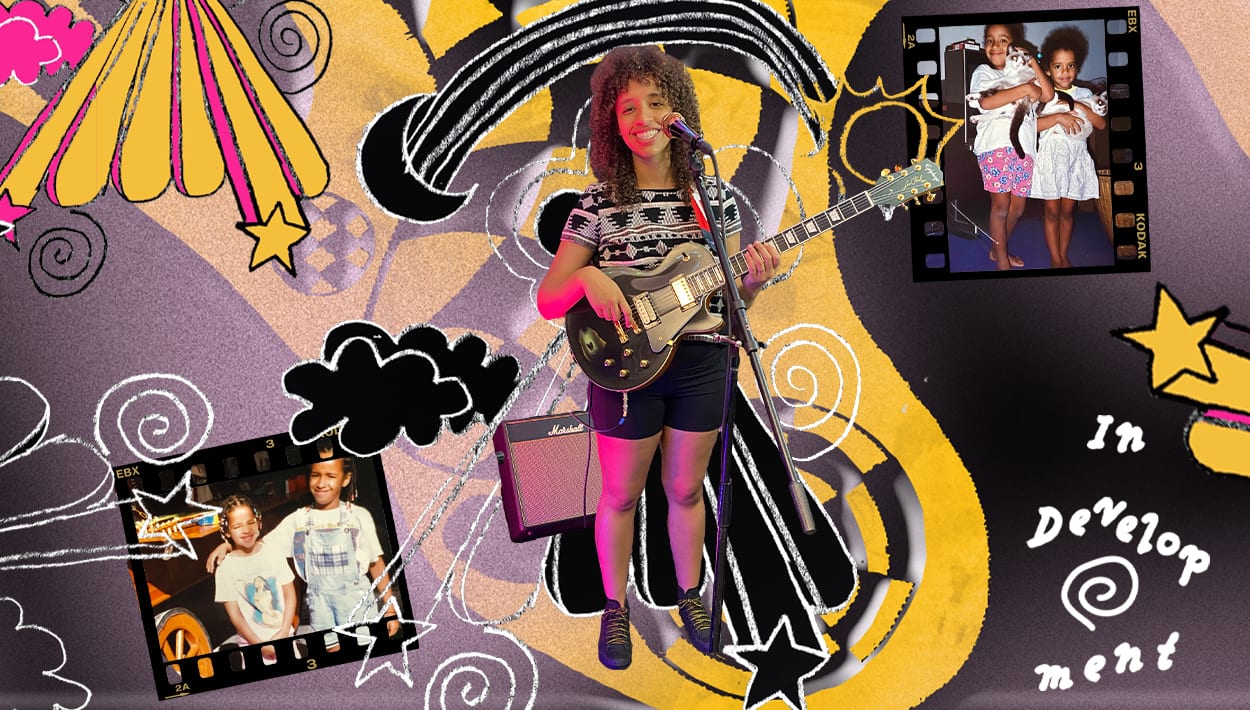
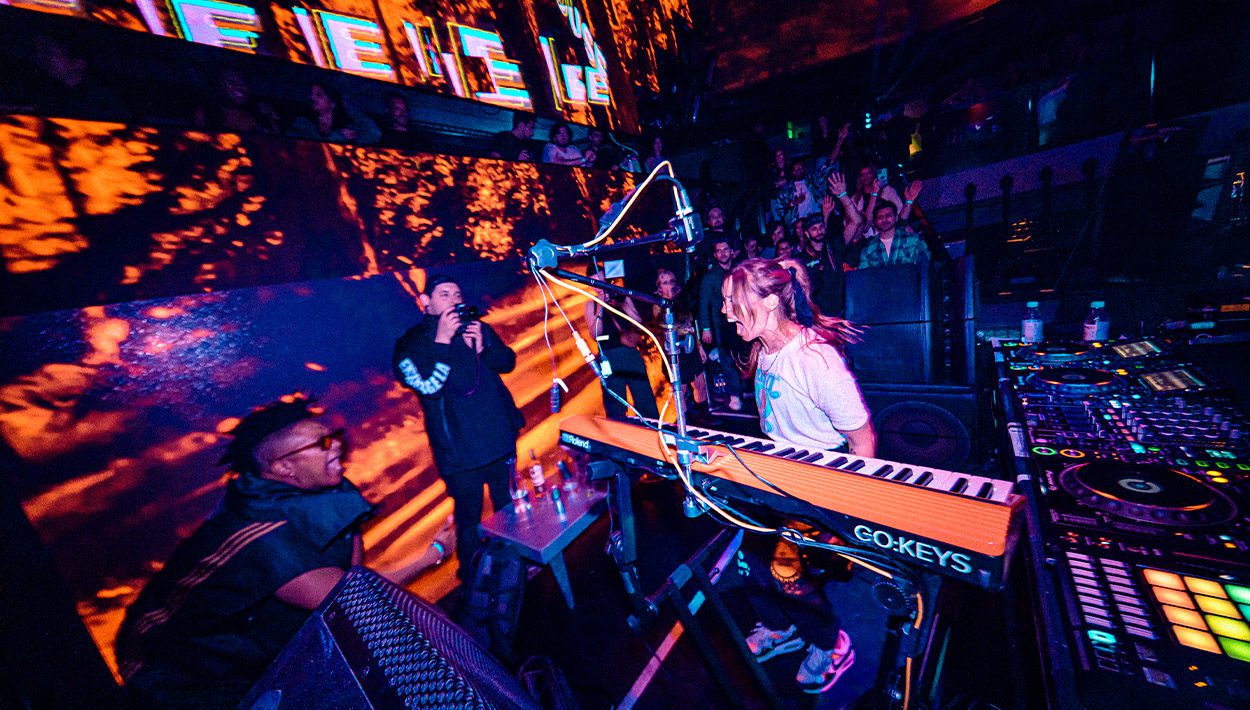
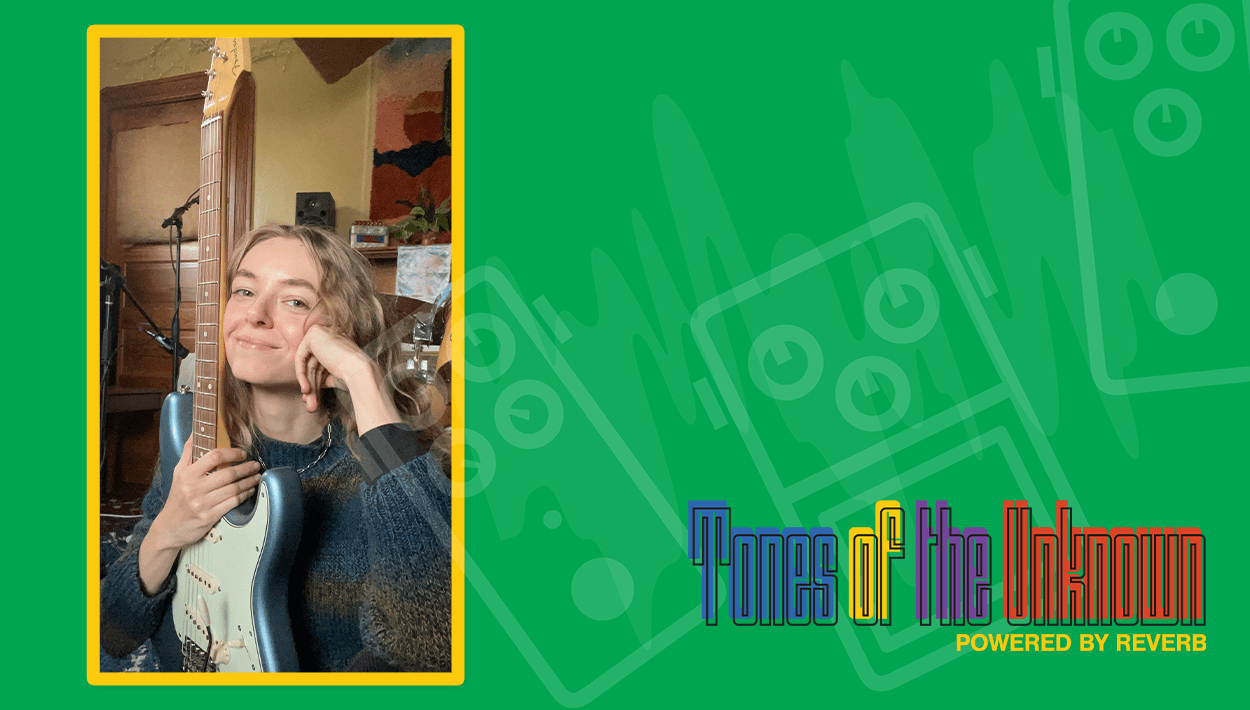
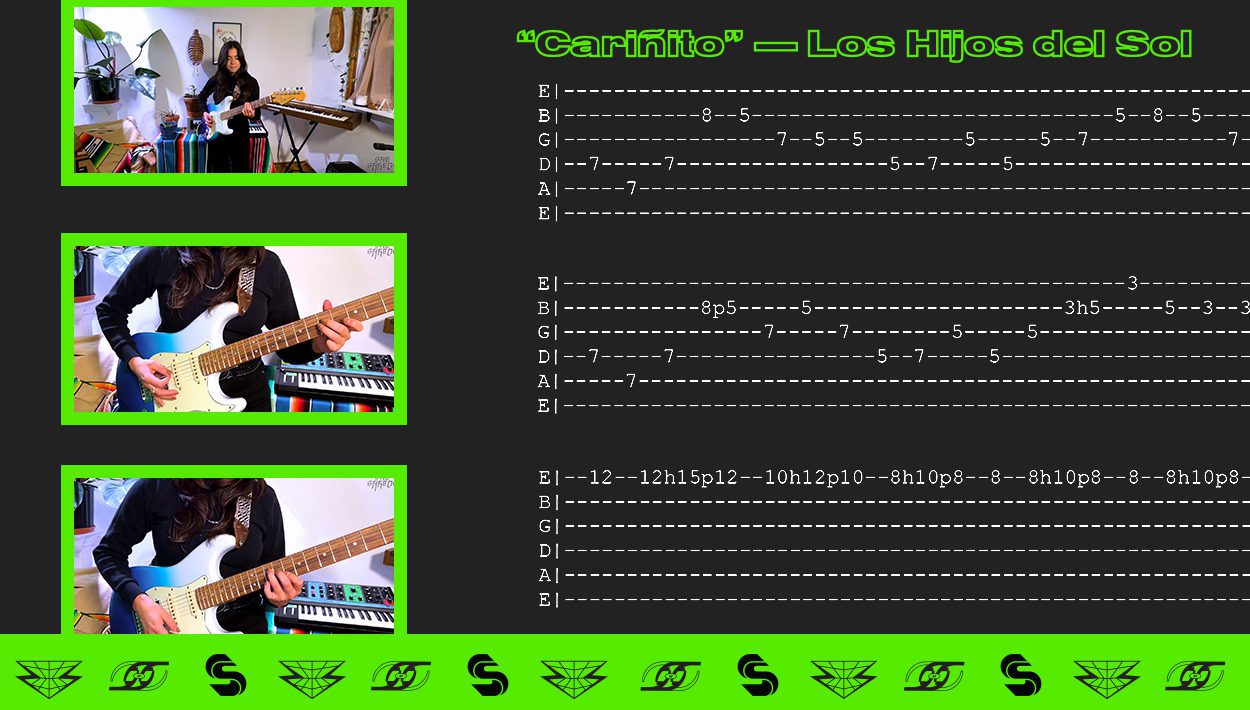
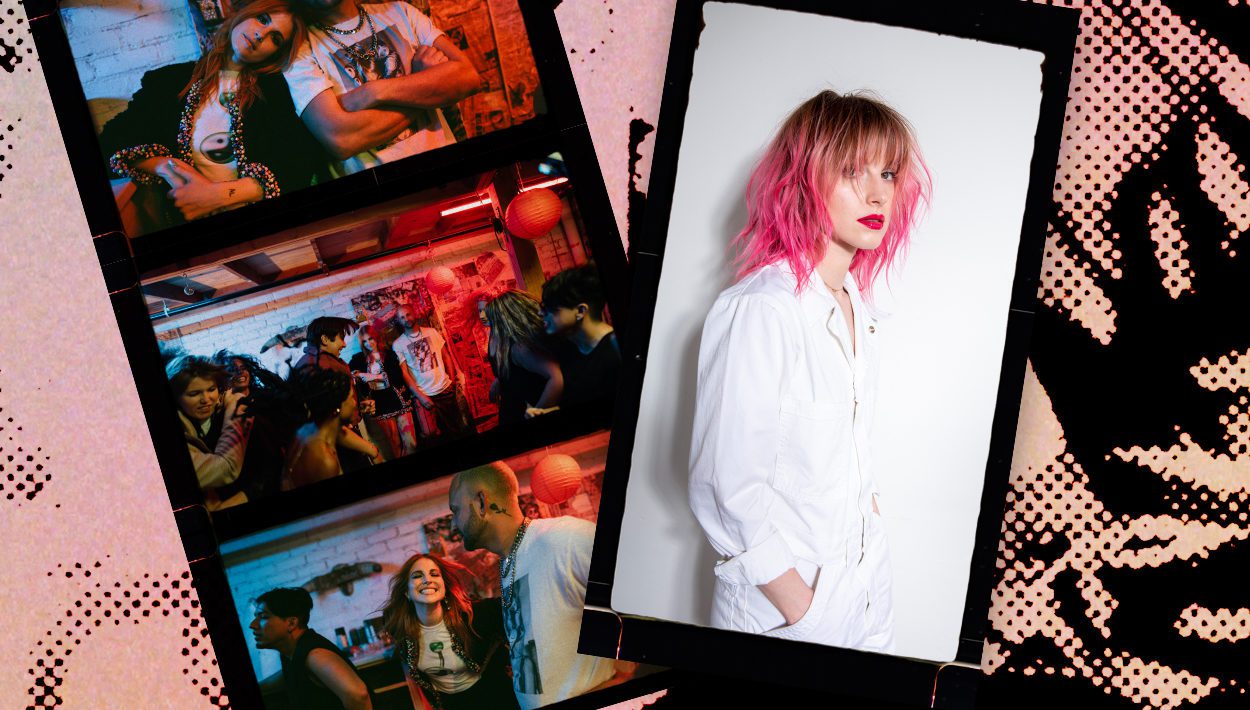
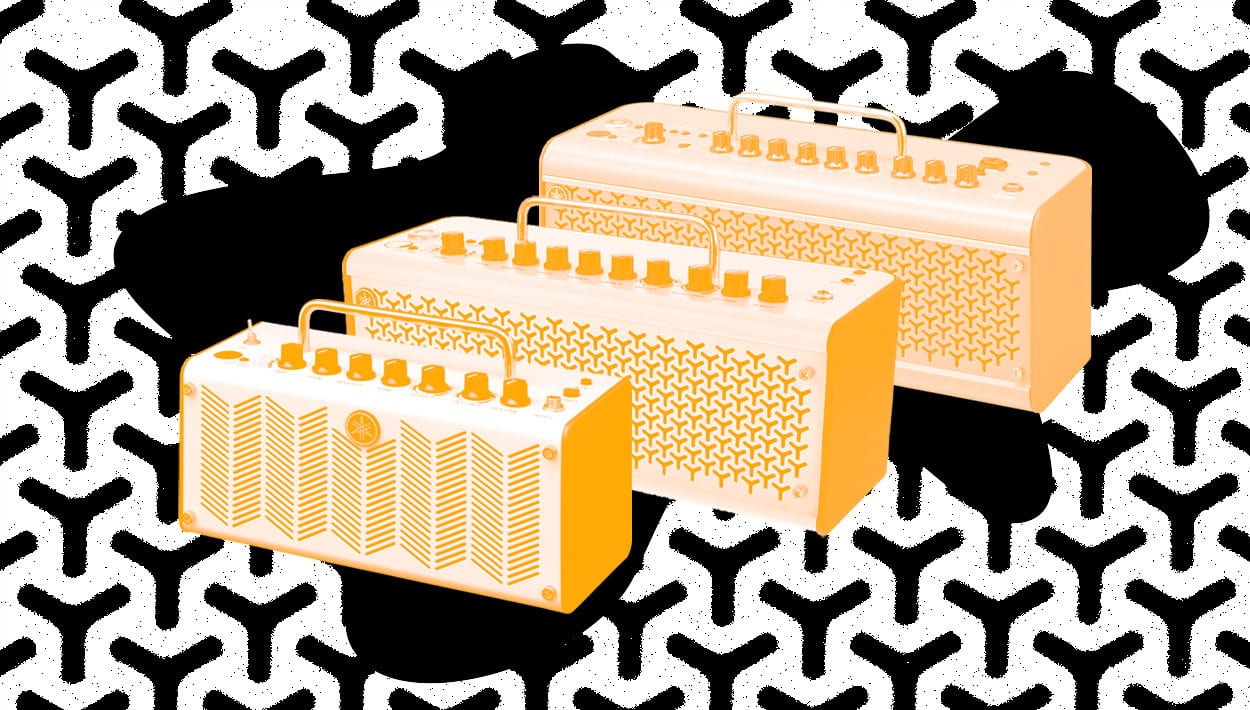
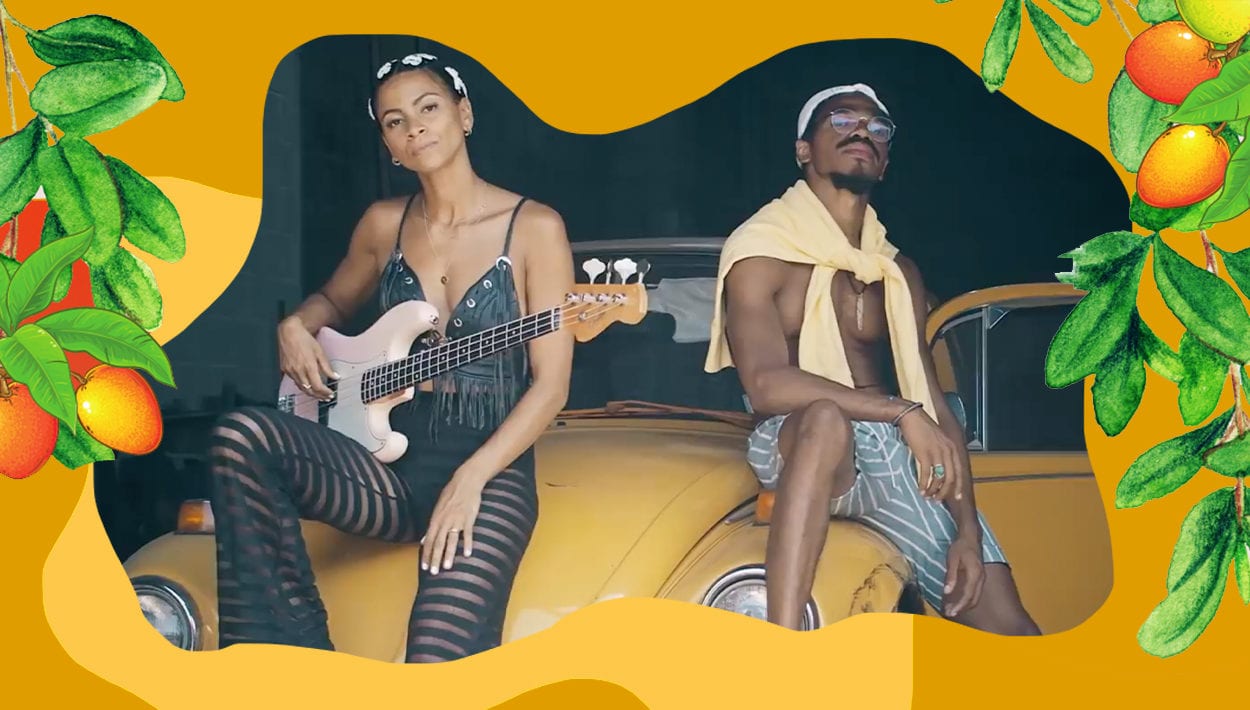
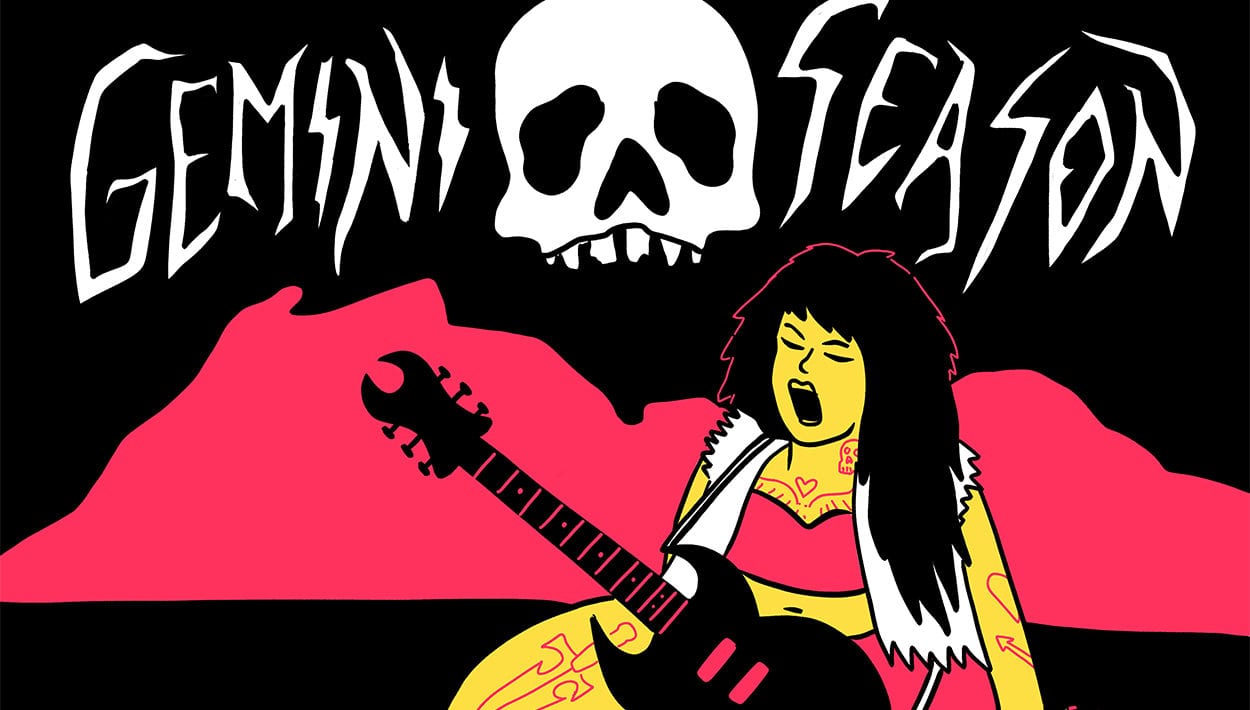
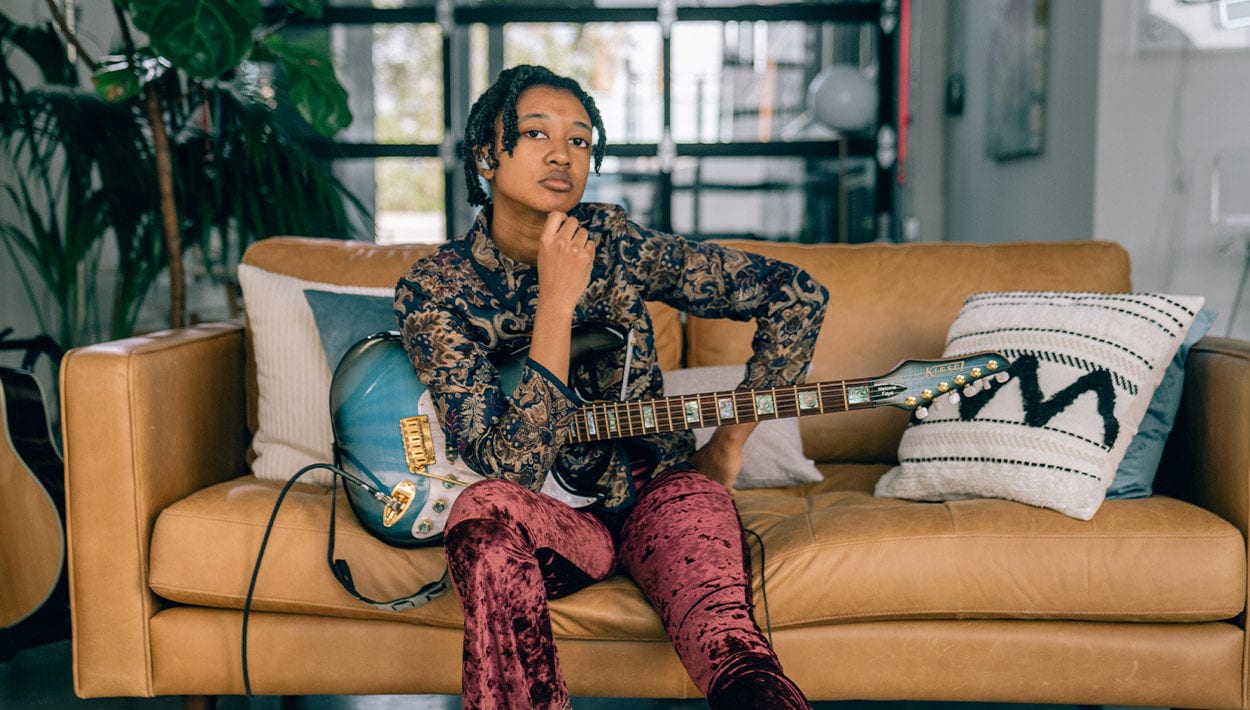
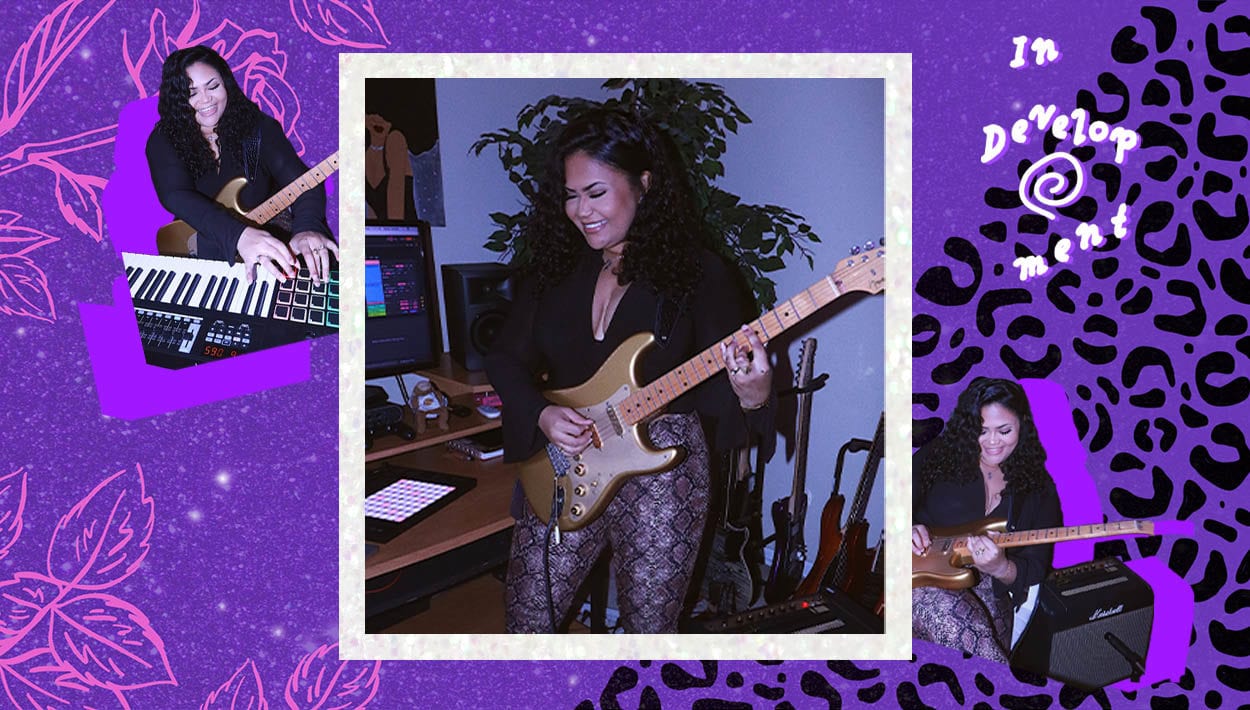
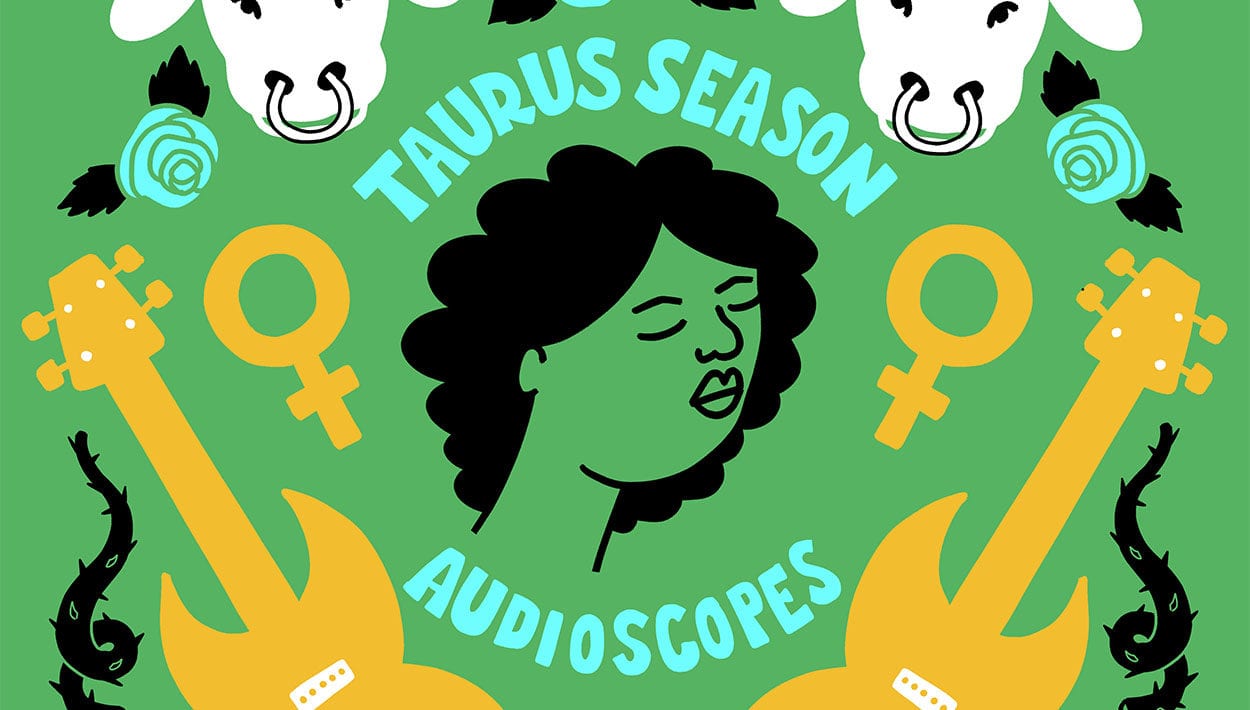


Comments
Great interview , Just Love Jackie’s personality, and Man Can this Girl Play ! Her songs come from the heart , and you feel it in your soul .
Comment by Stan on March 31, 2021 at 1:52 pmFab interview. Jackie is an amazing entity with a whole lot of talent. All the best ✌?
Comment by Harmony Lyric on March 31, 2021 at 8:14 pmHuge fan already, reading this, even more:)
Comment by Eliza Shaddad on April 1, 2021 at 2:09 amAlaqsa Store offers largest variety of Alaqsa Store fresh halal meat near me halal meat delivery near me to your doorstep. Now offering free shipping all over US.
Comment by julian jackson on June 1, 2021 at 7:21 pmA fantastic interview; Jackie’s personality is play tic tac toe particularly endearing; and, gosh, does this chick know how to play the guitar! You can feel it in your soul when you listen to her songs because she writes them with her heart in her songs.
Comment by anywayrobe on May 5, 2022 at 8:47 pmYour post is thoughtful, insightful and thorough in written and verbal communication, and has a talent for expressing ideas clearly. hoping to see posts like this in future.
Comment by Chris Jordan on September 25, 2022 at 11:39 pmDictionary Global
Kids today are so Madalin Stunt Cars talented. They can do whatever they want.
Comment by Billi on November 16, 2022 at 9:41 amI really like reading through a post that can particularly make people think in a actually major way. Also, definitely many thanks for permitting me to comment, which is fairly significant. five nights at freddy’s
Comment by fnaf on December 7, 2022 at 1:36 amYour blogs definitely stand out since the information is engaging while still being easy to comprehend!
Comment by regulatemourn on February 21, 2023 at 6:38 amgoogle
Let’s see what we have.
Comment by Avatar Game on March 29, 2023 at 2:26 amThey are also useful in juxtaposing the past and the present
Comment by spacebar clicker on April 10, 2023 at 6:53 pmWith the assistance of our editorial and content teams, we supply you with the best web information on any topic imaginable.Jnanabhumi AP is a startup founded by webmasters and bloggers who are dedicated about providing engaging jnanabhumiap.in material that is accurate, fascinating, and worth reading. We are a web community where you can get various information’s, resources, discussions on daily happenings, or news.
Comment by jnanabhumiap.in on May 16, 2023 at 4:24 amShe strives to stay true to herself and her artistic vision, rather than conforming to the limitations and expectations imposed by genre, industry norms, or aesthetics. This approach has allowed her to create a unique and distinctive sound that resonates with her listeners.
Comment by incredibox on June 16, 2023 at 6:08 pmI wish you the best of luck with your upcoming releases, and I’m sure your fans are excited to hear the new music and experience the concert movie!
Comment by Amanda The Adventurer on July 24, 2023 at 1:28 amTo all novice musicians who dream of being popular on soundcloud, I want to advise a very good solution in the form of https://promosoundgroup.net/collection/buy-music-promotion/buy-soundcloud-promotion/ and this will become your guide to the world of popularity. You will be able to gain a large number of followers and likes very quickly and thereby attract the necessary audience to your musical creativity.
Comment by Kerry Smith on August 7, 2023 at 7:58 pmThe conversation might explore how listeners react to music that defies easy categorization. Do audiences appreciate the diversity, or does it sometimes pose challenges in terms of finding a target audience?
Comment by pizza tower on August 27, 2023 at 8:21 pmIn this game, you must take control of our favorite granny and guide her through the streets. and…
Comment by Angry Gran on August 29, 2023 at 11:32 pmIn an industry often defined by categories and conventions, Austin-based musician Jackie Venson stands out as an artist who boldly defies the limitations of genre, industry norms, and aesthetics.
Comment by among us on September 5, 2023 at 11:57 pmI am overjoyed to be able to participate in this activity. I was able to gain a great deal of knowledge from the most influential members of the community as well as from those who possessed the most brilliant minds, and there were also endless opportunities for networking, code sprints, and casual chat.
Comment by play snake on September 21, 2023 at 12:43 amJackie Venson Live on Thursdays, so you can kind of see that pop up a few different times in my career, where I seem like I’m just stumbling ass backwards into the way. Thanks
Comment by heardle on November 7, 2023 at 8:34 pmEmbark on an adrenaline-pumping adventure with Stickman Boost, an electrifying first-person shooter video game. Navigate through challenging levels as you take command of a dynamic stickman, skillfully guiding him past obstacles through strategic moves, slides, and jumps. This gripping game offers an immersive experience, requiring precision and agility to conquer each level. Brace yourself for an action-packed journey where your mastery of controls is key to success. Stickman Boost delivers thrills and challenges, making it a must-play for enthusiasts seeking an exhilarating gaming experience. Are you ready to test your skills and conquer the obstacles that await in Stickman Boost?
Comment by Stickman Boost on January 11, 2024 at 11:46 pmWhat do you think about psychic services? This is an experience that every person should have at least once in their life. And it can really impact your life. I suggest starting with this site https://www.outlookindia.com/outlook-spotlight/best-free-psychic-reading-websites-in-2023-chat-phone-email-readings-news-301117 to learn about the best platforms for psychic readings, chat rooms, and services from psychics and other professionals .
Comment by Marcus Fernandez on February 1, 2024 at 12:10 pmImmerse yourself in the rich tapestry of UK Spotify streams where iconic classics and emerging talents alike paint a vibrant picture of British music culture. Here’s to the diverse sounds and captivating melodies that define the UK music scene! 🇬🇧
Comment by Jeson Doe on February 8, 2024 at 1:44 pm